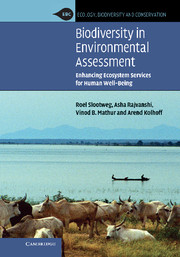Epilogue – Topics in need of further elaboration
Published online by Cambridge University Press: 05 July 2014
Summary
A number of topics have not been addressed in a separate chapter in this book. If we had covered everything then the book was in danger of becoming an encyclopaedia. The aim of this epilogue is to raise some of these additional topics in the anticipation and hope that others will address them – each deserves a book in its own right!
Climate change
Despite the rapidly expanding state of knowledge about climate change impacts, it is strange not to address this issue in a separate chapter of this book. Many environmental professionals view climate change as a symptom of our unsustainable use of the biophysical environment. A clear distinction is maintained between efforts to address the symptoms of climate change from those dealing with the causes. These distinctions are underpinned by the United Nations Framework Convention on Climate Change (UNFCCC) which identifies two responses to climate change: (i) mitigation of climate change by reducing greenhouse-gas emissions and enhancing sinks and (ii) adaptation to the impacts of climate change. In response to the issues pertaining to climate change, most research on adaptation and mitigation so far has been disparate, involving largely different communities of scholars who take different approaches to analyse the two responses. This dichotomy of objectives poses a significant challenge for the impact assessment community which is trying to see a potential for creating synergies between adaptation and mitigation. Impact assessment professionals have a responsibility to link climate, development, and environmental policies by, for example, linking energy efficiency (related to mitigation) to sustainable communities or poverty reduction (related to adaptation). Yet, in most impact assessments climate change is an externality to be taken into account when describing expected future developments in the description of autonomous developments.
- Type
- Chapter
- Information
- Biodiversity in Environmental AssessmentEnhancing Ecosystem Services for Human Well-Being, pp. 328 - 333Publisher: Cambridge University PressPrint publication year: 2009



